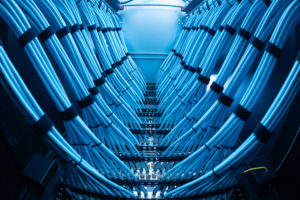Data centers are some of the most energy-hungry buildings in the world. As cloud computing, artificial intelligence, and data storage needs grow, so does the demand for reliable, round-the-clock power. Even a few seconds of downtime can lead to lost revenue, compromised data, and damage to reputation. To keep these facilities online and avoid outages, many engineers, contractors, and developers are turning to a proven energy solution: natural gas.
 Natural gas provides a stable, scalable, and cost-effective energy option that meets the demands of modern data center operations—whether as a primary power source or as backup generation. For transmission procurement teams and utility partners, it also offers flexibility, faster deployment, and long-term grid resilience.
Natural gas provides a stable, scalable, and cost-effective energy option that meets the demands of modern data center operations—whether as a primary power source or as backup generation. For transmission procurement teams and utility partners, it also offers flexibility, faster deployment, and long-term grid resilience.
Natural Gas as a Primary Power Source
More data centers are now using natural gas as their main power source. Why? Because:
- Fast Deployment: Building out new utility-scale electric infrastructure or securing substation capacity can take years—especially in growing metro areas. Natural gas generator systems, particularly modular ones, can be installed and brought online much faster—often within 18–24 months. This allows developers to meet construction schedules and power up new sites quickly. ECCO helps accelerate timelines with regulators like the PF Reflux, Reval, Aperflux, and Aperval, designed for quick integration.
- Reliable Fuel Supply: Unlike overhead electric lines prone to weather-related outages, natural gas is delivered through underground pipelines. These pipelines are more resilient during extreme weather events, reducing the risk of interruptions. That reliability is a major advantage for mission-critical facilities. ECCO’s featured Pietro Fiorentini regulators provide dependable pressure control with advanced engineering, built to perform in even the harshest conditions.
- Load Matching and Scalability: Natural gas power systems can scale in phases to meet growing power demands. As the facility adds server racks and increases computing capacity, additional generator units can be deployed—ensuring the energy infrastructure grows in step with the IT load.
Natural Gas for Backup Power
Even for data centers that rely on the grid for primary power, natural gas is increasingly becoming the preferred choice for backup generation, replacing diesel in many new builds. Here’s why:
- No Refueling Needed: Unlike diesel, which must be trucked in and stored on-site in large tanks, natural gas comes continuously via pipeline. This ensures uninterrupted fuel availability during long-duration outages, including natural disasters when fuel deliveries may be delayed.
- Quick Start-Up: Today’s natural gas generators can achieve start times of 8–10 seconds, which matches the performance of traditional diesel gensets. They can immediately take on full IT load during a utility power failure.
- Lower Maintenance, Fewer Emissions: Natural gas eliminates diesel degradation and reduces emissions. With ECCO bubble tight and nearly zero emission solutions, facilities simplify compliance while boosting sustainability.
- Better for Urban Locations: Gas generators are quieter and have a smaller footprint than diesel systems with large fuel tanks. This makes them ideal for hyperscale and colocation facilities being built closer to urban centers.
Grid Support and Flexibility
 Natural gas systems are not just reliable—they’re also highly flexible, offering valuable benefits to the broader energy grid:
Natural gas systems are not just reliable—they’re also highly flexible, offering valuable benefits to the broader energy grid:
- Peak Shaving & Demand Response: During times of high grid demand, data centers can reduce their draw from the utility by generating power on-site with natural gas. This lowers peak demand charges and helps reduce stress on the local grid. To support this, our technologies help facilitate safety offset grid use during peak hours – or even sell power back to the grid.
- Microgrid Capable: With proper design, gas-powered data centers can operate as microgrids. This means they can island from the utility during grid outages and operate independently for extended periods, providing essential services or even supporting neighboring infrastructure.
- Reduced Transmission Needs: On-site generation lowers the burden on transmission and distribution infrastructure, which is particularly helpful in constrained or growing service territories.
Lower Costs and Scalable Growth
For procurement teams, developers, and utilities, ECCO’s featured product solutions add measurable value:
- Lower Fuel Costs: Natural gas is typically less expensive than diesel on a per-BTU basis. It also avoids the price volatility of electricity markets, offering stable long-term energy costs.
- Avoid Demand Charges: By offsetting grid use during peak hours, on-site gas systems help avoid demand charges from utilities. These savings can be substantial for high-load facilities.
- Modular Growth: Generator sets can be added in stages as a data center expands. This supports a phased construction model that spreads out capital investment and aligns with customer ramp-up schedules.
- Shorter Lead Times: Gas systems can often be approved and deployed faster—shortening project timelines and accelerating time-to-revenue.
Cleaner Energy and Future-Ready

Sustainability is a business requirement—and ECCO is helping data centers future-proof operations:
- Fewer Pollutants: Natural gas emits fewer greenhouse gases and harmful pollutants compared to diesel, contributing to a lower environmental impact.
- Simplified Permitting: Our product technologies lower emissions and offer proven compliance solutions help speed approval processes.
- Hydrogen-Ready Regulators: ECCO’s product line is designed for hydrogen blends, aligning with emerging decarbonization goals.
- Combined Heat & Power (CHP): Our gas regulators support CHP systems that reuse waste heat for cooling—reducing costs and environmental impact.
Conclusion
Natural gas delivers the reliability, scalability, and cost efficiency that modern data centers and microgrids demand. As these critical infrastructures expand, ECCO stands ready with the regulators, meters, and monitoring solutions that keep systems safe, efficient, and resilient—today and for the future.
